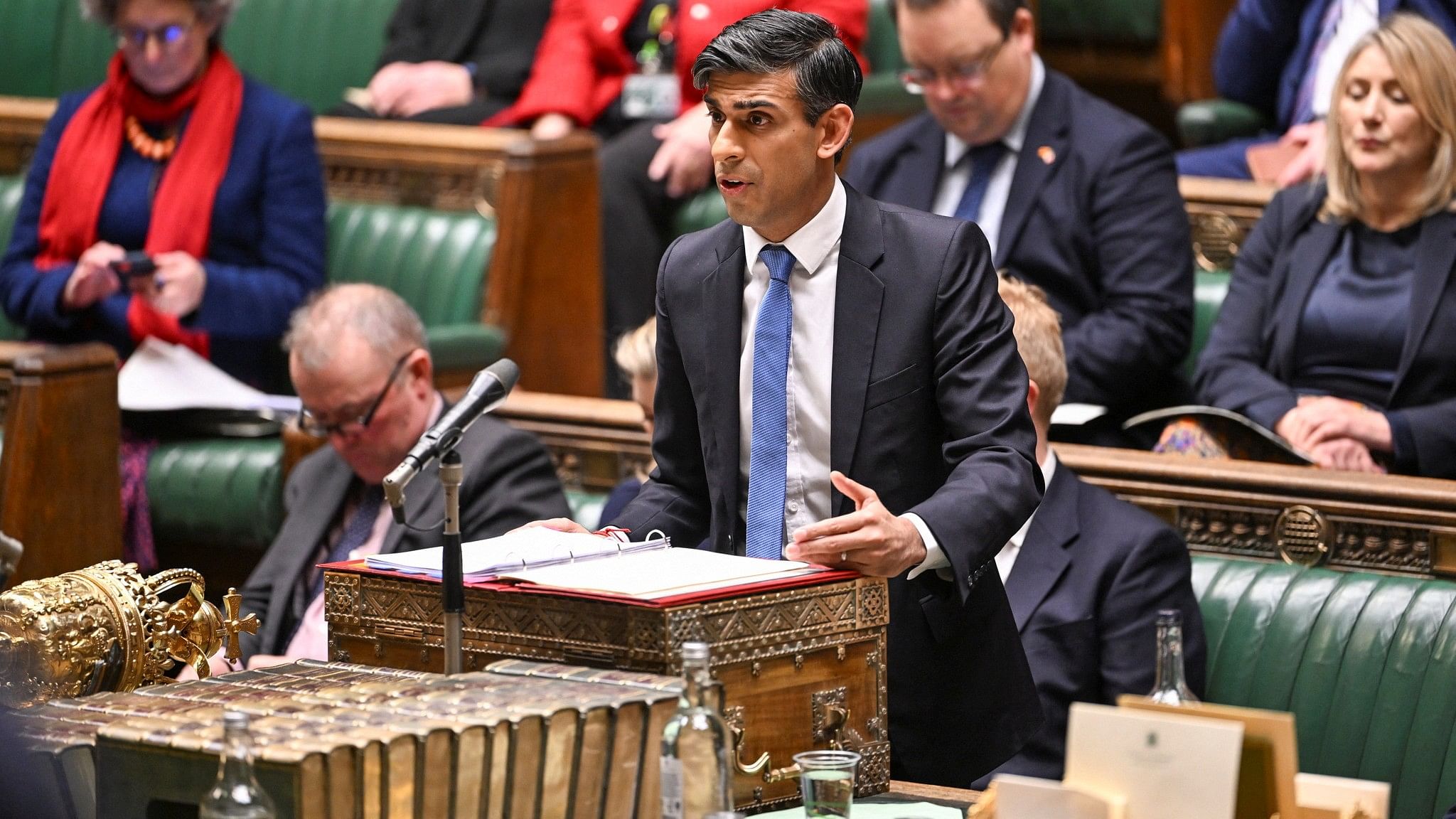
British Prime Minister Rishi Sunak.
Credit: Reuters Photo
London: After suffering two heavy blows to his leadership ahead of a general election later this year, British Prime Minister Rishi Sunak on Friday blamed “low voter turnout” as a reason for the Opposition Labour Party overturning strong Conservative majorities to win by-elections in England.
Reacting to the disastrous outcome in two previously Tory-held seats, the 43-year-old said they were "particularly challenging" by-elections. However, he stressed that the results did not reflect “enthusiasm” for the Opposition Labour Party.
"Midterm by-elections are always difficult for incumbent governments, and the circumstances of these by-elections were of course particularly challenging,” he told reporters during a trip to Essex.
"If you look at the results [there was] very low turnout, and it shows that we've got work to do to show people that we are delivering on their priorities. That's what I am determined to do,” he said.
"It also shows that there isn't a huge amount of enthusiasm for the alternative in Keir Starmer and the Labour Party, and that's because they have no plan. If you don't have a plan, you can't deliver real change," he added.
Labour’s Dan Egan won the House of Commons seat of Kingswood, south-west England, and the party’s Gen Kitchen won Wellingborough, in the East Midlands region of England. The results reflect double trouble for the British-Indian leader as the Conservatives had won both seats by decisive margins in the last general election under Boris Johnson in December 2019.
Another emerging trend saw the far-right Reform UK – the re-organised anti-immigration Brexit Party – coming third, ahead of the Liberal Democrats and Green Party, piling further pressure on the Conservatives on contentious issues such as migration.
Sunak asserted that the “actual choice” at the next general election will be "between me and him", referring to Starmer.
"A vote for anyone who isn't the Conservative candidate, whether that's Reform or anyone else, is just a vote to put Keir Starmer in power," Sunak said when asked about the performance of Reform UK.
The latest results from this week’s polls are the ninth and 10th by-election defeats for the Tory-led government since the 2019 general election.
The by-poll in Kingswood was held after Tory MP Chris Skidmore resigned as an MP in protest over Sunak's green policies. Labour's Egan managed to overturn his majority of more than 11,000 in the seat.
In Wellingborough, the vote followed Tory MP Peter Bone being recalled by his constituency over claims of bullying and sexually inappropriate behaviour, which he denies. Labour’s Kitchen overturned his majority of more than 18,000 to win the seat with a swing of 28.5 per cent – the second highest of all time.
“The Kingswood and Wellingborough results show that people want change and are ready to put their faith in a changed Labour Party to deliver it,” said Labour leader Sir Keir Starmer.
“The Tories have failed, Rishi's recession proves that. Labour is back in the service of working people,” he said.
The twin defeats will come as a major blow for the governing Tories as they prepare for a general election, which Sunak has indicated will be held in the second half of the year. The party, which has already been trailing Labour in opinion polls, sought to downplay the significance of the by-election result as a vote of discontent against the Tories.
Conservative MP and former minister in Boris Johnson’s Cabinet Sir Jacob Rees-Mogg told the BBC the Kingswood result was "not as bad as I'd expected" as Tory voters appeared to have stayed at home.
He suggested more could turn out at a general election, which he said "focuses people's minds in a different way to a by-election". He insisted that support for Sunak's leadership was "solid" and "by-elections don't change that".
However, news of the economy falling into recession earlier this week and this double poll blow will rattle the Sunak-led Tories as the scale of anti-incumbency becomes clear.
“The party will be concerned not only by having lost these seats, but also by the scale and manner of its defeats. Its share of the vote fell by a whopping 37.6 points in Wellingborough, the biggest drop the party has ever suffered in a by-election it was defending,” writes pollster Sir John Curtice, Professor of Politics at Strathclyde University.
“However, these were by-elections where voters' discontent with the Conservatives was seemingly not matched in equal measure by its enthusiasm for Labour,” he said.
The results also provide some relief for Keir Starmer after a challenging week for the Labour leader, having scaled back his party's green investment plan and been embroiled in an antisemitism crisis.